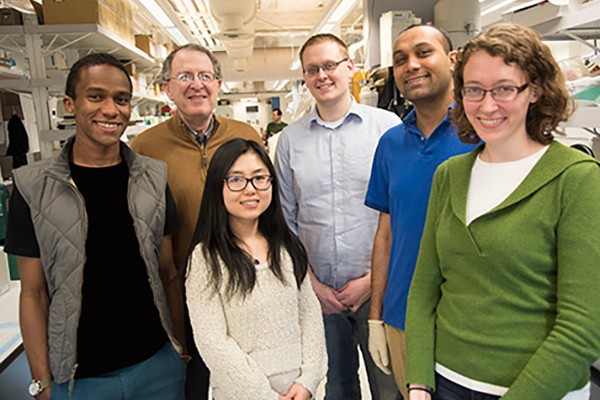Gordon to receive Keio Medical Science Prize
Jeffrey I. Gordon, MD, the Dr. Robert J. Glaser Distinguished University Professor at Washington University School of Medicine in St. Louis, is a recipient of the 2015 Keio Medical Science Prize.
Mimicking diet changes of global travel reveals clues to gut health
With the growing understanding of the importance of gut bacteria in human health, researchers at the School of Medicine studied gut motility, measuring the transit time of food moving through the gastrointestinal tract in mice in a way that mimicked the dietary effects of world travel. The study demonstrates ways to uncover how even a single ingredient, such as turmeric, can affect health through interactions of diet and gut microbes.
Gordon awarded King Faisal International Prize in Medicine
Jeffrey I. Gordon, MD, director of the Center for Genome Sciences and Systems Biology, has been awarded the King Faisal International Prize in Medicine.
Washington People: Justin Serugo
After fleeing his war-torn homeland, the Democratic Republic of Congo, Justin Serugo was relocated to St. Louis, where he eventually landed a job at the School of Medicine. He now works on a childhood malnutrition project.
New center aims to use gut microbiome discoveries to improve human nutrition
A new center at the School of Medicine aims to tackle the challenges of feeding the world’s rapidly expanding population and improving global health by linking efforts to develop more nutritious foods with discoveries gleaned from the gut microbiome.
NIH director, Sen. Roy Blunt discuss research funding in medical school visit
U.S. Sen. Roy Blunt (left) and Francis S. Collins, director of the National Institutes of Health, visited the School of Medicine this week to talk to researchers, administrators and entrepreneurs about scientific research and the need to boost and sustain federal funding for it.
Dickson Prize awarded to medical scientist
Jeffrey I. Gordon, MD, has won the 2014 Dickson Prize in Medicine for his pioneering studies demonstrating how the tens of trillions of microbes that live in the gut influence human health.
Gordon elected to American Philosophical Society
Jeffrey I. Gordon, MD, has been elected to the American Philosophical Society, founded in 1743 by Benjamin Franklin for the purpose of “promoting useful knowledge.”
Gordon wins Passano Foundation Award
Jeffrey I. Gordon, MD, director of the Center for Genome Sciences and Systems Biology, has won the 2014 Passano Foundation Award for his pioneering studies showing how the trillions of microbes that live in the gut influence human health.
Altering mix of gut microbes prevents obesity, but diet remains key factor
The mix of microbes living inside the gut can protect against obesity, but a healthy diet is critical, according to School of Medicine scientists who transplanted intestinal microbes from obese and lean twins into mice and fed the animals different diets. Pictured are researchers Vanessa Ridaura, a graduate student, and Jeffrey I. Gordon, MD, director of the Center for Genome Sciences and Systems Biology.
View More Stories

